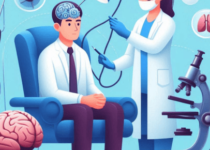Balancing Act: Strategies for Maintaining Your Overall Health and Well-Being

In today’s fast-paced world, achieving and maintaining overall health and well-being requires a thoughtful approach that integrates various aspects of life. From physical fitness to mental wellness, the strategies we adopt can significantly influence our quality of life. This article outlines essential strategies for maintaining health, focusing on the role of primary healthcare providers and the innovative approach of TMS for chronic pain management.
The Role of Primary Healthcare Providers
A primary healthcare provider (PHCP) is often the first point of contact for individuals seeking medical attention. They play a crucial role in maintaining health by offering preventive care, managing chronic conditions, and providing personalized health advice.
Preventive Care and Regular Check-Ups
Regular visits to your PHCP can help identify potential health issues before they escalate. Preventive care includes routine screenings, vaccinations, and health assessments that are essential for early detection of conditions such as hypertension, diabetes, and cancers. By engaging with a PHCP, individuals can establish a tailored health plan that includes lifestyle modifications, dietary recommendations, and necessary health screenings.
Holistic Approach to Health
PHCPs often emphasize a holistic approach to health, addressing not only physical ailments but also mental and emotional well-being. This may involve referrals to specialists when needed, such as mental health professionals, nutritionists, or physical therapists, ensuring comprehensive care that meets all aspects of an individual’s health.
Managing Stress and Mental Health
Incorporating strategies for stress management and mental health is essential for achieving overall well-being. Chronic stress can lead to various health problems, including cardiovascular issues, depression, and weakened immune function.
Mindfulness and Meditation
Practicing mindfulness and meditation can help reduce stress and improve mental clarity. These techniques encourage individuals to focus on the present moment, fostering a sense of peace and reducing anxiety. Regular practice can enhance emotional resilience, making it easier to navigate daily challenges.
Physical Activity
Engaging in regular physical activity is another vital strategy for managing stress and enhancing mental health. Exercise releases endorphins, which are natural mood lifters. Whether it’s a brisk walk, yoga, or strength training, finding an activity that you enjoy can make a significant difference in your overall mental well-being.
Nutrition and Healthy Eating Habits
Nutrition plays a critical role in maintaining health and preventing chronic diseases. A balanced diet provides the necessary nutrients to support bodily functions and improve overall health.
Whole Foods and Nutrient-Dense Choices
Incorporating whole foods—such as fruits, vegetables, whole grains, lean proteins, and healthy fats—into your diet can lead to better health outcomes. These foods are rich in vitamins, minerals, and antioxidants, which are essential for maintaining energy levels and supporting immune function.
Hydration
Proper hydration is often overlooked but is crucial for overall health. Drinking adequate amounts of water helps maintain bodily functions, aids in digestion, and can improve skin health. Aim for at least eight glasses of water daily, adjusting for physical activity and environmental factors.
TMS for Chronic Pain Management
Chronic pain is a debilitating condition that affects millions of individuals worldwide. Traditional treatments often include medication, physical therapy, or surgery. However, Transcranial Magnetic Stimulation (TMS) has emerged as an innovative approach for managing chronic pain.
What is TMS?
TMS is a non-invasive procedure that utilizes magnetic fields to stimulate nerve cells in the brain. It is primarily known for its effectiveness in treating depression but has shown promise in alleviating chronic pain conditions. By targeting specific areas of the brain associated with pain perception, TMS can help reduce pain levels and improve overall quality of life.
Benefits of TMS
The benefits of TMS Chronic Pain include minimal side effects compared to traditional pain medications, a shorter recovery time, and a focus on the underlying neurological components of pain. Patients often report significant improvements in their pain levels, leading to enhanced physical activity and emotional well-being.
Social Connections and Community Engagement
Strong social connections are vital for emotional health. Engaging with friends, family, and community can provide a support network that enhances mental well-being.
Building Relationships
Investing time in relationships can reduce feelings of loneliness and increase feelings of belonging. Activities such as volunteering, joining clubs, or participating in community events can foster connections and create a sense of purpose.
Seeking Support
When faced with challenges, seeking support from others is essential. Whether through professional counseling or support groups, discussing experiences with others can provide relief and encouragement.
Conclusion
Maintaining overall health and well-being is a multifaceted endeavor that requires a balanced approach. By leveraging the expertise of primary healthcare providers, managing stress, adopting healthy eating habits, exploring innovative treatments like TMS for chronic pain, and nurturing social connections, individuals can cultivate a fulfilling and healthy lifestyle. Prioritizing these strategies will not only enhance physical health but also promote mental and emotional well-being, ultimately leading to a more balanced life.



